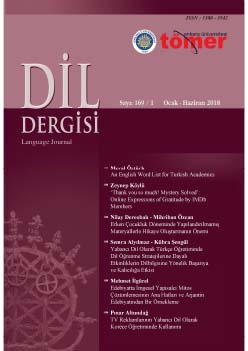Yabancı Dil Olarak Türkçe Öğretiminde Dil Öğrenme Stratejilerine Dayalı Etkinliklerin Dilbilgisine Yönelik Başarıya ve Kalıcılığa Etkisi
In Teaching Turkish as a Foreign Language, the Effects of the Activities Based on Language Learning Strategies on Success and Permanency in Relation to Grammar
Author(s): Semra Alyılmaz, Kübra Kübra ŞengülSubject(s): Language and Literature Studies, Education, Foreign languages learning, Turkic languages
Published by: Ankara Üniversitesi TÖMER
Keywords: Teaching Turkish as a Foreign Language; Language Learning Strategies; Grammar;
Summary/Abstract: The purpose of this research is to determine the effects of the activities based on memory, cognitive and compensation strategies that are involved in direct strategies in classification of language learning strategies of Oxford (1990), on the success and permanence for B2 level students’ grammar comprehension skills. Experimental and control group consist of B2 level of 41 foreign national students who are learning Turkish language in Nevşehir Hacı Bektaş Veli University Turkish and Foreign Language Teaching Applied and Research Center (NEÜ TÖMER) in 2014 - 2015 spring season. In the study which was carried out by mixed method, quantitative and qualitative research approaches were used together and the data obtained from these methods was integrated with comments. In the quantitative dimension of the research, out of the experimental method; Pretest, Posttest and Control Group pattern were used. The experimental process continued for 6 weeks. Grammar comprehension success test was applied on the groups at the beginning and end of the process which was developed by the researcher. After 22 days of obtaining the posttest of data, success test was re-applied so as to obtain the data of permanence. In the qualitative dimension in which case study was used; data collection techniques such as focus group discussion and language learning journal were used. According to the obtained findings, it was seen that in the success of grammar of the students in experimental group have increased remarkably in comparison to control group, when the language learning permanency avarage points were compared, there has been a significant distinction between experimental and control group; in favor of experimental group, among the applied memory, cognitive and compensation strategies; comparative analysis, deduction, re-unification, routing and the usage of synonym strategies are particularly effective in teaching grammar; however, they find that re-unification strategy is more beneficial in respect to Turkish language structure. In the used memory, cognitive and compensation strategies, the performing of the activities towards four language skills and the usage of it in a communicational dimension effected the students’ grammar in a positive way.
Journal: Dil Dergisi
- Issue Year: 169/2018
- Issue No: 1
- Page Range: 67-110
- Page Count: 44
- Language: Turkish

